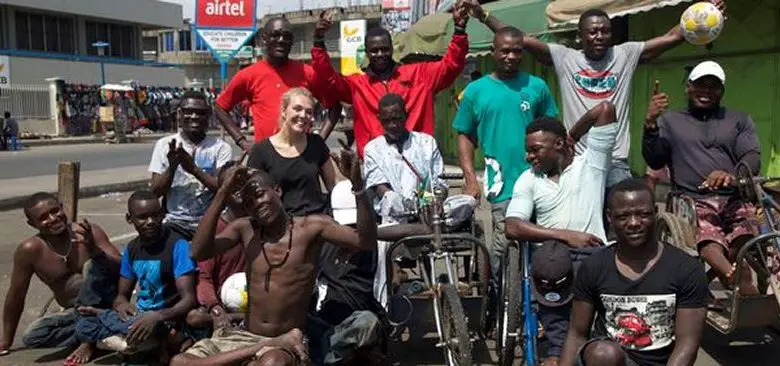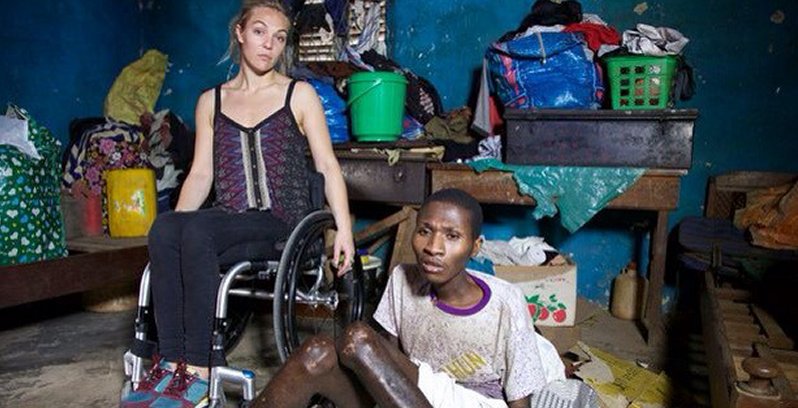
We don’t want to become like the World’s worst place to be disabled
As part of the BBC’s Defying the Label season, disabled presenter and model Sophie Morgan asks: “Where is the worst place in the world to be disabled?” Her question took her to Ghana where she witnessed the horrific treatment of disabled people. Regular Disability Horzions writer Raya AlJadir reflects on the show and disability across the world.
No one could deny that The World’s Worst Place To Be Disabled was an incredibly insightful documentary, giving us a glimpse into the harrowing lives of disabled people in Ghana where they are chained, imprisoned and labelled as snakes and animals. But, I wasn’t shocked by any of its contents and it didn’t surprise me.
Being of a Middle Eastern background and having lived in that region until the age of 9, I learnt a lot about the treatment of people living with disability and experienced much of it first hand.
I never came across any disabled children during the period that I lived in the Middle East. I grew up thinking I was unique and special. But in adulthood I learnt that the reason I didn’t see anyone like me was because they were hidden away. Where I lived disabled people are seen to represent shame. They are seen as a sign of failure on the family’s part because they couldn’t produce a ‘normal’ child. Most often the mother would have been blamed most as she was the one giving birth. As a result many mothers endured both pity and judgement.
As such, hiding the disabled child is often seen as the best option. By keeping the disabled person away from preying eyes, some families genuinely believe that they are protecting not just the individual with disability, but the siblings, cousins, aunts etc. The whole family become judged as there is an overwhelming belief that their children will carry the same gene and will inherit the disability.
In the documentary we saw a 30-year-old man who had been confined and hidden away at his home for his whole life. This reminded me of my grandmother nanny, who also had a disability. She too was kept behind closed doors in my grandparents’ home, never allowed to leave. When visitors came she was hidden in her room. If anyone did see her, especially children, they often screamed and became frightened by her.
It was only myself, my siblings and cousins that were not scared, but her wider family deserted her and never visited for fear of stigma and the shame that they would face. The more I saw of the documentary, the more convinced I grew that there are many worse places around the world to be a person living with disability, not just Ghana.
In my view, the most interesting part of the documentary was looking at how religion is used to justify many of the wrong doings that people are committing against the disabled. One, beyond belief included murdering disabled children as a spiritual act. Religion is abused all over the world and used to achieve someone’s own motives.
Whether it’s by politicians, social movements or even so called preachers, they use they fact that people are desperate for hope and have strong faith, so what better way to gain profit and precedence than manipulating these venerable people. Added to that, cultural norms and the desire to be like everyone else are in fact stronger than religious belief; people tend to live by what they have always known and seen.
I say this from personal experience. My parents are both highly educated – my mother was a teacher and father a business man – yet they sought spiritual healing to help me be able to walk. After seeking medical advice in the UK, USA and France to try to help me be ‘normal’ and then realising that there was no treatment that would cure me, they returned home disappointed.
Feeling desperate, they succumbed to the pressure of relatives and friends and began a journey of spiritual healing. I lost count of the number of times I visited a ‘special and gifted’ man who would recite prayers to me to summon the spiritual leaders. They would make strange demands of my mother. I recall one guy in particular heating dates and sticking them to me from the waist down. He requested that I keep them there for 3 days and perform some sort of ritual. As soon as I got home I demanded to have the dates washed off me. After my constant refusal and non-cooperation, my mother gave up and we stopped visiting such figures.
When I first moved to the UK I was so surprised when I saw other disabled people complaining about life here and remember thinking that these people are so lucky and they don’t even realise it. Years later and I have become like the people that I once thought were actually spoilt.
But the reality is that if we don’t complain and just think; ‘oh we are better than other countries,’ then we will never progress. We will remain static while the world is moving and some parts regressing even further in their treatment of disabled people.
While it is a fact that the UK is far more advanced in the field of disability, there is no denying that recent cuts and new legislation have caused misery for many and wrecked their lives. Some people are developing severe depression and even committing suicide.
In a way, it’s similar to what was reported in the documentary; essentially the Ghanaian government is failing its disabled population and our government could be heading the same way if we as disabled people don’t keep on complaining, campaigning, reporting and writing about every aspect that limits our independence.
We owe it to the wider disabled community to keep on fighting for our rights in living life to the fullest without any restrictions or prejudice.
By Raya AlJadir
Did you see the documentary? If not, you can still watch it on BBC iPlayer.
Get in touch by messaging us on Facebook, tweeting us @DHorizons, emailing us at editor@disabilityhorizons.com or leaving your comments below.

this tears my heart apart…I’m ashamed to say I can’t watch this documentary. Reading this article alone tells me everything I already know but hide deep inside…I can’t bear to acknowledge it. That for as much b****tching that I do about my disability. I live like a Queen compared to the thousands (millions?) that suffer in developing countries. What CAN WE DO? What can I DO? My Dr and I were just talking about this fact and I expressed that it’d be a dream for me if I could somehow (I don’t know…?) help/educate/advocate for folks like this. Somehow help and inspire, especially young ones, that their lives are equally valuable as anybody elses and that the disabled shouldn’t be ‘thrown away’ but encouraged to contribute the talents n skills I KNOW they have. To the author of this article, what can I DO?